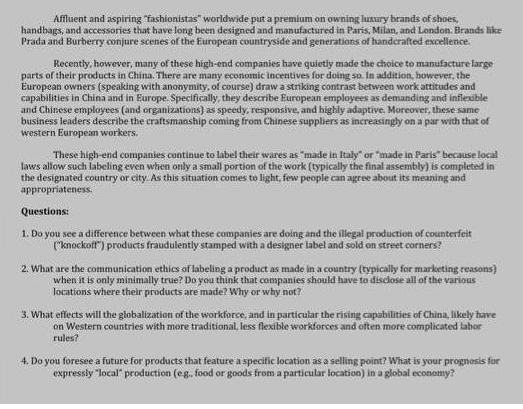Answered step by step
Verified Expert Solution
Question
1 Approved Answer
Affluent and aspiring fashionistas worldwide put a premium on owning luxury brands of shoes, handbags, and accessories that have long been designed and manufactured

Affluent and aspiring "fashionistas" worldwide put a premium on owning luxury brands of shoes, handbags, and accessories that have long been designed and manufactured in Paris, Milan, and London. Brands like Prada and Burberry conjure scenes of the European countryside and generations of handcrafted excellence. Recently, however, many of these high-end companies have quietly made the choice to manufacture large parts of their products in China. There are many economic incentives for doing so. In addition, however, the European owners (speaking with anonymity, of course) draw a striking contrast between work attitudes and capabilities in China and in Europe. Specifically, they describe European employees as demanding and infleuble and Chinese employees (and organizations) as speedy, responsive, and highly adaptive. Moreover, these same business leaders describe the craftsmanship coming from Chinese suppliers as increasingly on a par with that of western European workers. These high-end companies continue to label their wares as "made in Italy" or "made in Paris" because local laws allow such labeling even when only a small portion of the work (typically the final assembly) is completed in the designated country or city. As this situation comes to light, few people can agree about its meaning and appropriateness. Questions: 1. Do you see a difference between what these companies are doing and the illegal production of counterfeit ("knockoff") products fraudulently stamped with a designer label and sold on street corners? 2. What are the communication ethics of labeling a product as made in a country (typically for marketing reasons) when it is only minimally true? Do you think that companies should have to disclose all of the various locations where their products are made? Why or why not? 3. What effects will the globalization of the workforce, and in particular the rising capabilities of China, likely have on Western countries with more traditional, less flexible workforces and often more complicated labor rules? 4. Do you foresee a future for products that feature a specific location as a selling point? What is your prognosis for expressly "local" production (eg., food or goods from a particular location) in a global economy?
Step by Step Solution
★★★★★
3.34 Rating (154 Votes )
There are 3 Steps involved in it
Step: 1
Ans1 Yes I can see the difference between these companies are doing and the illegal production of counterfeit products fraudulently stamped with a designer label and sold on street corner as we can se...
Get Instant Access to Expert-Tailored Solutions
See step-by-step solutions with expert insights and AI powered tools for academic success
Step: 2

Step: 3

Ace Your Homework with AI
Get the answers you need in no time with our AI-driven, step-by-step assistance
Get Started


